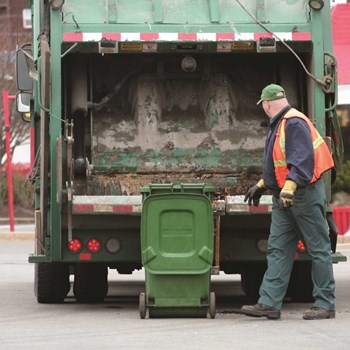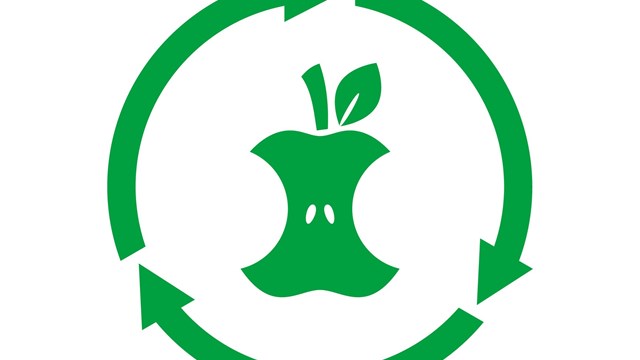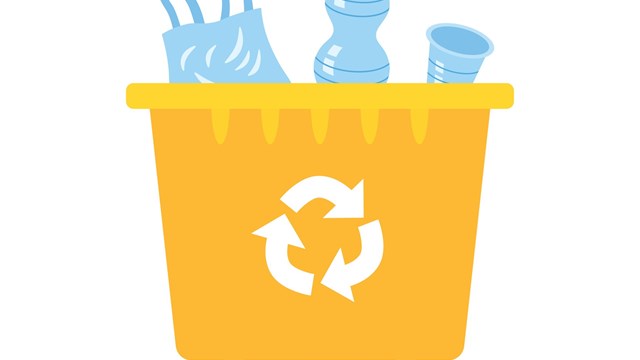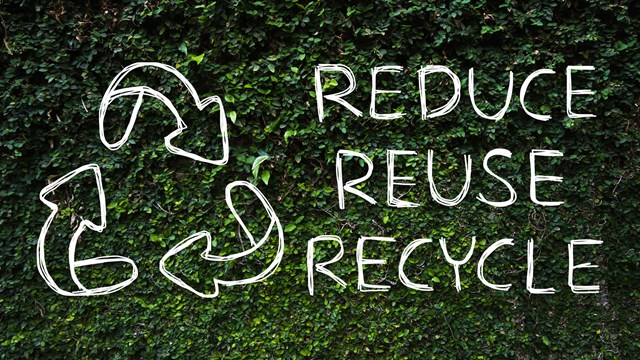
Most people don’t think much about their garbage after they toss it down the chute or into a container for pickup, but the fact is, removing a multifamily community's trash and recyclables can be a big job, especially in a private development not served by municipal or city-run sanitation services. Who picks up the refuse? How frequently it is collected? What gets recycled? These are all concerns that many multifamily residents should consider as factors in both their bottom line and in their community's core services.
Public or Private?
Imagine living in a community where the trash wasn’t hauled away for a few weeks, and you get a pungent sense of how important carting services are to urban and suburban living. While selecting a dependable waste hauling company is vital to good co-op/condo management, that doesn't mean hiring such an outside contractor can't be negotiated in the best interests of the community. And as owners of the community, residents hold the cards in negotiating with service companies who want to do business with them. But the trick is in knowing how to play those cards.
Understanding what a community expects of its waste hauling company versus what the hauler can provide are good starting points for residents to consider when delving into the waste management process. Only after evaluating the community’s needs—as well as other factors, such as budget—can residents determine which waste disposal solutions best fit them.
The difference between private waste management companies and public municipal sanitation services is often first defined by local law. Residents of New York’s five boroughs pay a city tax that covers garbage pickup and sometimes, city officials insist a building must receive such services. Not always—some buildings, especially commercial buildings, are required by law to have private carters handle the task.
Still, communities often have other reasons to hire a carter. Even in those communities that receive the city’s waste removal service, garbage that quickly accumulates from move-outs, renovations, evictions and other trash-generating instances often is handled by private carters. Geography can play a role in choice, too. In some of the suburbs, city garbage trucks won’t service communities that are located along nonpublic streets. So, private companies do the work.
Several things differentiate public waste removal services from private carting companies, including services offered and pricing. New York’s Department of Sanitation (DSNY) garbage trucks come weekly on a set schedule, with changes in the schedule dependent upon holidays. Private carters, on the other hand, will pick up garbage from a community or multifamily building as frequently as the building’s management would like. That could be two or more times a week, depending upon the building’s needs.
City garbage removal services also are not competitively bid, meaning that if your building is designated by the city as an address that will be serviced by DSNY sanitation trucks, your building’s board cannot bid out a contract for the service and take the best bid. You have to accept the city’s sanitation service, which itself is hampered by some restrictions regarding what it can charge customers. The city has a rate cap of $10.42 per 100 pounds or $15.89 per cubic yard that can be charged on waste removed, says Robert Shirlaw of Brooklyn-based Big Apple Sanitation. “You also don’t have flexibility with the city [sanitation service]," he says.
When a building does have flexibility in its carting service, residents have the most say in how the service will be delivered to them. But they can only voice their preferences if they know what their options are—and after that, what things are most important for them to receive.
Bidding & Vetting
As with any maintenance agreement, inking a private waste removal company to serve a community should follow a specific process. That begins with the management company publicizing a request for proposals (RFP) for companies seeking to have a contract to perform waste removal services for the building. Specifications of the length of the contract and general parameters of it are provided in an advertisement for carters, who respond if interested by sending a proposal outlining what work they will do under the contract and at what price.
Typically, waste removal contracts are for a term of from one to three years. Having plenty of options to consider before choosing a carter is recommended. “The best way to do it is to put out the bid and get it to as many companies as possible,” Shirlaw says. “But you have to ask, ‘What do I need in customer service?’ The lowest price is not necessarily the best service. What are the days the contractor works? It can’t always be about the bottom line—you can end up hurting yourself.”
Some communities have residents with a high interest in ecological issues, and these consumers are interested in lowering their carbon footprint and reducing unnecessary noise in the city. Some companies, such as the national carter Waste Management, are now increasingly using cleaner burning, quieter trucks which run on compressed natural gas. These trucks run more efficiently, and many residents appreciate them being used rather than gasoline-fueled trucks, says Bill Plunkett, a spokesman for national waste removal firm Waste Management.
When considering a potential carter to serve the building, board members and other residents of a community should think beyond payment terms and ask how long the company has been in business, and what its overall reputation is. Has it had any problems recently, with authorities or lawsuits? A special group of New York Police Department officers are tasked with sanitation, focusing on problems with carters such as overweight vehicles and leaking trucks. A carter that is repeatedly cited by these officers—such as a company who recently had five of its trucks pulled over in one day by police—could be more trouble than it is worth.
Residents also need to ask the carter what kind of service it can provide, and whether or not it can provide the specific services the building requires. Can the company provide recycling services and if so, which kinds of recycling? If there is an issue with the service, can the building’s management contact the carting company easily and have the staff quickly address the concern? What types of receptacles will the company provide to the customer as part of the contract? How many of the containers will be needed for the building?
Paul Zambrotta, of Mr. T Carting, a third generation family-owned company based in Glendale, says board members should ask a potential carter if its equipment is safe and up to date and if the company keeps timely maintenance logs. What are the company’s hiring requirements, does it have a drug testing program, Zambrotta says. “Check the company’s safety record with the state department of transportation,” he adds.
It’s important to check to see that the company’s insurance—be it liability or vehicle insurance—is up to date, as well as its licenses. Carters in the city of New York must be licensed to do the work by the New York City Business Integrity Commission. Up to date registration of vehicles with the state DOT also is crucial, since an omission in any of the aforementioned areas should be considered a large red flag. A company that is not properly licensed and insured is not to be trusted.
It is important to know what the payment terms will be for the carter’s contract, and who at the building will be the financial point of contact for the carter, if anything goes awry with payments. Waste hauling companies are often paid monthly, but some, like Mr. T Carting, pay their drivers weekly and have their own transfer facility, which could affect a company’s pricing.
“We’re not the cheapest guy in town, but if you want the best, you pay for the best,” Zambrotta says. “We pride ourselves on our reputation, our cleanliness, and our timeliness.”
When responding to an RFP, employees of a contractor will assess the property to research a bid before submitting the proposal. The carting company will want to know how many days a week service will be provided to the building, and if there will be any restraints to entrance to the building, such as a locked garage that can only be opened by a security guard. Hours of operation issues, and other potential problems such as questions regarding overhead wires or clearance, also will be of interest to a carter, as will be the question of how much trash the building generates.
Tonnage factors into pricing. That’s why residents should be mindful of how much refuse they are generating. There are ways to lower the amount of waste going into the carting stream, though, such as through in-home composting kits and by using garbage disposals.
Prior to 1997, food waste disposals in kitchen sinks weren’t permitted in New York City. But after years of lobbying the city, garbage disposal advocates won the right for citizens in the city to have the devices. The technology isn’t really new at all, but garbage disposals can nonetheless drastically reduce the amount of solid waste that goes into the carting stream. Garbage disposals get rid of all food waste, including bones, by grinding it up and flushing it into the sewer system
Food waste is 70 percent water, and comprises a significant portion of all garbage created by multifamily communities. When a building reduces its food waste, it reduces its carting costs by lowering the amount of tonnage that is carted.
“The average homeowner generates two to five pounds of food waste per day,” says Clint Taylor, New York manager for InSinkerator, which is the largest manufacturer of garbage disposal units in the country. “The purpose of the food waste disposer is to take the food waste out of the solid waste stream, not have it carried away in trucks, and keep it out of landfills.”
Whether your building or association opts to use a carting company, individual disposal units, or even composting, the key is to remember that there are multiple options for dealing with your community's waste. Hiring a waste removal company is just like hiring any service professional; there's some legwork involved in finding the best fit, and in establishing and maintaining a good working relationship. Choosing the right company or technology can both save money and reduce environmental stress but it's up to your board and management to research the possibilities and make the best choice for your community's needs.
Jonathan Barnes is a freelance writer and a frequent contributor to The Cooperator.






Leave a Comment